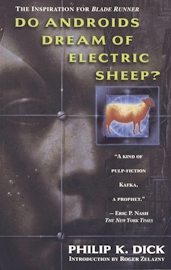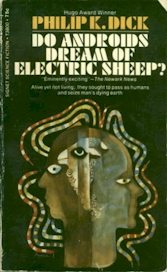
Blade Runner (1968)
movie tie-in edition paperback (left)
Del Rey trade paperback edition
244 pages
cover art by Bruce Jensen (right)

Denver Science Fiction & Fantasy Book Club |
 |
Do Androids Dream of Electric Sheep / Blade Runner (1968) movie tie-in edition paperback (left) Del Rey trade paperback edition 244 pages cover art by Bruce Jensen (right) |
 |
|
Amy's Short Summary:
Philip K. Dick - Blade Runner / Do Androids Dream of Electric Sheep
After World War Terminus, radioactive dust has contaminated the earth. So many animals have died that owning a live animal is a status symbol. In Northern California Rick Deckard is a bounty hunter. His job is to kill, euphemistically called retire, runaway androids. But the newest androids are more clever and harder to detect. Understanding the theology of Merceriscm, and the Voight-Kampff empathy scale test are used to separate humans from androids. Deckard goes to The Rosen Association in Seattle to verify the police's standard profile tests work on the Nexus-6 androids, to assure they don't designate an authentic human as an android. Rachael Rosen almost fools Deckard and shakes his confidence. There is a group of eight androids. The department's chief bounty hunter, Dave Holden, got two of them before he was shot. Deckard is assigned to eliminate the rest. summary written by misuly@aol.com |
 |
Do Androids Dream of Electric Sheep? another book cover Aaron's older paperback cover |
| Dan | 7 | Amy | 8 |
 |
10 Wow! Don't miss it 8-9 Highly recommended 7 Recommended 5-6 Mild recommendation 3-4 Take your chances 1-2 Below average; skip it 0 Get out the flamethrower! U Unfinishable or unreadable - Skipped or no rating given |
| Cheri | 8 | Barb | - | ||
| Aaron | 8 | Cynthia | 8 | ||
| Lars | - | Jackie | - | ||
| Richard | 9 | Kerry | 8 |